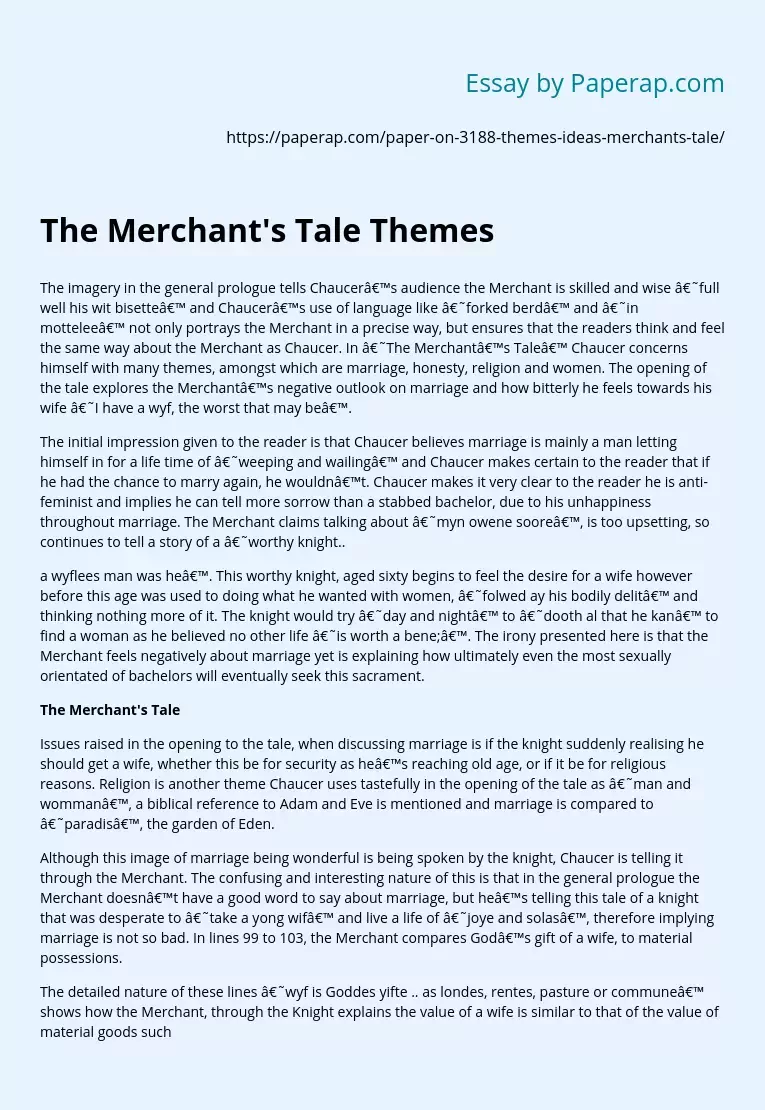The Merchant's Tale Themes
The imagery in the general prologue tells Chaucer’s audience the Merchant is skilled and wise ‘full well his wit bisette’ and Chaucer’s use of language like ‘forked berd’ and ‘in mottelee’ not only portrays the Merchant in a precise way, but ensures that the readers think and feel the same way about the Merchant as Chaucer. In ‘The Merchant’s Tale’ Chaucer concerns himself with many themes, amongst which are marriage, honesty, religion and women. The opening of the tale explores the Merchant’s negative outlook on marriage and how bitterly he feels towards his wife ‘I have a wyf, the worst that may be’.
The initial impression given to the reader is that Chaucer believes marriage is mainly a man letting himself in for a life time of ‘weeping and wailing’ and Chaucer makes certain to the reader that if he had the chance to marry again, he wouldn’t. Chaucer makes it very clear to the reader he is anti-feminist and implies he can tell more sorrow than a stabbed bachelor, due to his unhappiness throughout marriage.
The Merchant claims talking about ‘myn owene soore’, is too upsetting, so continues to tell a story of a ‘worthy knight.. a wyflees man was he’. This worthy knight, aged sixty begins to feel the desire for a wife however before this age was used to doing what he wanted with women, ‘folwed ay his bodily delit’ and thinking nothing more of it. The knight would try ‘day and night’ to ‘dooth al that he kan’ to find a woman as he believed no other life ‘is worth a bene;’.
The irony presented here is that the Merchant feels negatively about marriage yet is explaining how ultimately even the most sexually orientated of bachelors will eventually seek this sacrament.
Issues raised in the opening to the tale, when discussing marriage is if the knight suddenly realising he should get a wife, whether this be for security as he’s reaching old age, or if it be for religious reasons. Religion is another theme Chaucer uses tastefully in the opening of the tale as ‘man and womman’, a biblical reference to Adam and Eve is mentioned and marriage is compared to ‘paradis’, the garden of Eden.
Although this image of marriage being wonderful is being spoken by the knight, Chaucer is telling it through the Merchant. The confusing and interesting nature of this is that in the general prologue the Merchant doesn’t have a good word to say about marriage, but he’s telling this tale of a knight that was desperate to ‘take a yong wif’ and live a life of ‘joye and solas’, therefore implying marriage is not so bad. In lines 99 to 103, the Merchant compares God’s gift of a wife, to material possessions.
The detailed nature of these lines ‘wyf is Goddes yifte .. as londes, rentes, pasture or commune’ shows how the Merchant, through the Knight explains the value of a wife is similar to that of the value of material goods such as land and furnishings. The story of creation in Genesis not only explains God’s creation of a woman to keep Adam company, but shows the how a woman caused the downfall of mankind, by being tempted to eat the forbidden fruit in the Garden of Eden.
This is a story Chaucer’s target audience would we have been aware of. The Merchant shows the Knight being fond of marriage, but at the same time is taking a dig at women for causing the downfall of mankind, and implying this is what will happen if the Knight marries. A brief reference to anti-feminist literature writer Theofrast, by the knight reassures readers that he understands what he’s taking onboard when seeking a wife. ‘What force though Theofraste liste lye? ..
a trewe servant dooth moore diligence’ claims Theofrast, but the knight, knowing Theofrast thinks a servent would be more faithful than a waife, still stays keen on the idea of marriage and we know this by the reference to the wedding vows ‘keep him, sik and hool … him to love and serve … till he sterve’ he regards marriage as important, and is being slightly feminist as he’s reassuring the audience that a woman will always stick by her man, as she swears to it on their wedding day.
Ultimately, Chaucer explores a variety of themes and issues in the opening of the Merchant’s tale, and although he approaches marriage negatively, he seems to contradict himself when telling the story about the knight. Nevertheless, due to the general prologue and Chaucer’s description of the Merchant with ‘forked berd’ shows him as a shady character, so however Chaucer seems to be portraying this knight, we know it’s likely to change as the tale continues.
The Merchant's Tale Themes. (2019, Dec 05). Retrieved from https://paperap.com/paper-on-3188-themes-ideas-merchants-tale/

